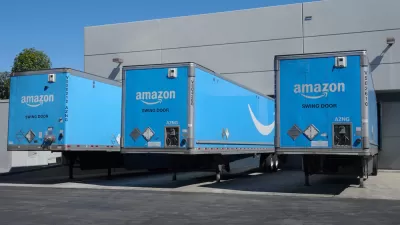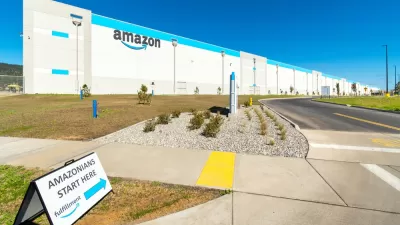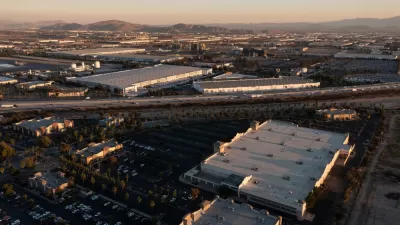As e-commerce giants like Amazon build more and more facilities, advocates say a regional approach is needed to prevent sprawl and look beyond local benefits.

"A current surge in warehouse construction is raising concern among planners and environmentalists that scarce open space is being eaten up by giant warehouses that generate truck traffic on rural roads, increase contaminated stormwater runoff from more paved surfaces, and industrialize the state’s few remaining rural enclaves," reports Jon Hurdle in NJ Spotlight. But the warehouses also bring jobs and taxes, incentives valued by local leaders who object to the prospect of losing control of land use decisions in their jurisdictions. With Amazon as New Jersey's largest employer, advocates say "the trend raises wider issues that should also be addressed by county or statewide authorities" rather than left up to "myriad local governments" narrowly focused on their own "fiscal self-interest."
Tim Evans, director of research for the nonprofit New Jersey Future, argues that "a 'regional perspective' is needed to ensure that increasing demand for the storage of imported goods does not result in the development of land that is better used for farming or recreation, and that the most suitable land for warehousing — such as that near the ports of Newark, Elizabeth and Bayonne — does not get used for another purpose that could easily be done elsewhere."
As a home-rule state, New Jersey largely gives local governments the final say over land use decisions, and Evans admits "any attempt to dilute the power of local government over land-use planning would prompt strong pushback." But decisions made at the local level can affect their surrounding area, as seen in Warren County, where county officials have urged municipalities to present a united front in resisting the construction of new warehouse facilities on greenfield land. To Evans and other advocates of regional planning, a regional approach is necessary to "help the state avoid the worst impacts of the warehouse boom which is underpinned by e-commerce and fueled by the COVID-19 pandemic."
FULL STORY: Warehouse sprawl shows need for regional approach to planning, advocates say

Planetizen Federal Action Tracker
A weekly monitor of how Trump’s orders and actions are impacting planners and planning in America.

Congressman Proposes Bill to Rename DC Metro “Trump Train”
The Make Autorail Great Again Act would withhold federal funding to the system until the Washington Metropolitan Area Transit Authority (WMATA), rebrands as the Washington Metropolitan Authority for Greater Access (WMAGA).

DARTSpace Platform Streamlines Dallas TOD Application Process
The Dallas transit agency hopes a shorter permitting timeline will boost transit-oriented development around rail stations.

Renters Now Outnumber Homeowners in Over 200 US Suburbs
High housing costs in city centers and the new-found flexibility offered by remote work are pushing more renters to suburban areas.

The Tiny, Adorable $7,000 Car Turning Japan Onto EVs
The single seat Mibot charges from a regular plug as quickly as an iPad, and is about half the price of an average EV.

Supreme Court Ruling in Pipeline Case Guts Federal Environmental Law
The decision limits the scope of a federal law that mandates extensive environmental impact reviews of energy, infrastructure, and transportation projects.
Urban Design for Planners 1: Software Tools
This six-course series explores essential urban design concepts using open source software and equips planners with the tools they need to participate fully in the urban design process.
Planning for Universal Design
Learn the tools for implementing Universal Design in planning regulations.
Municipality of Princeton
Roanoke Valley-Alleghany Regional Commission
City of Mt Shasta
City of Camden Redevelopment Agency
City of Astoria
Transportation Research & Education Center (TREC) at Portland State University
US High Speed Rail Association
City of Camden Redevelopment Agency
Municipality of Princeton (NJ)





























